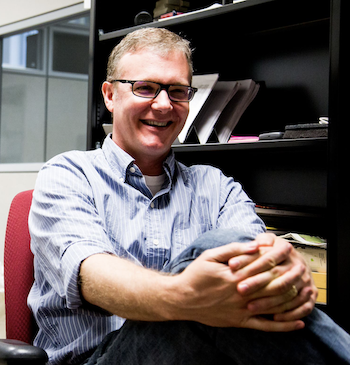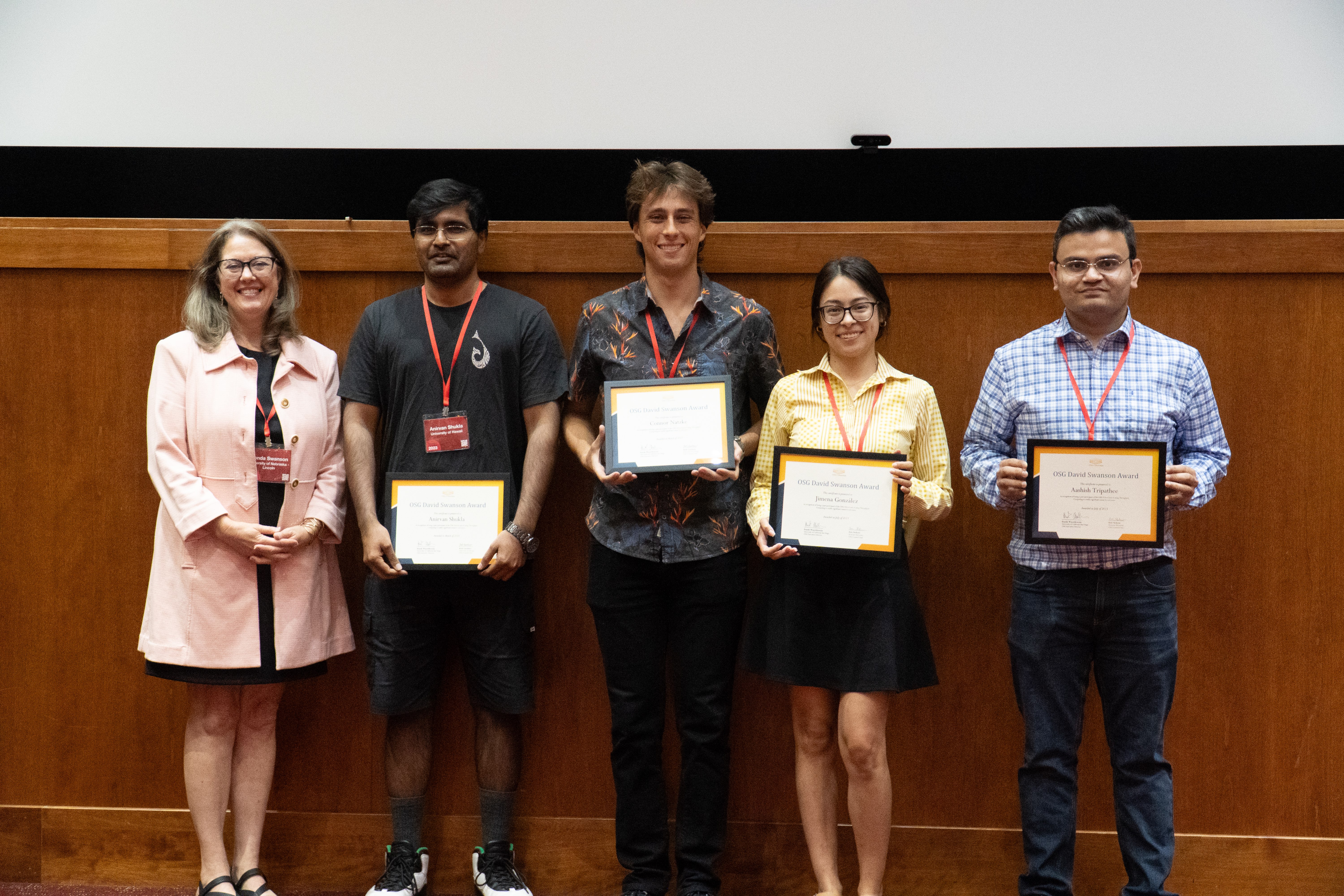David Swanson Award

The OSG David Swanson Award was established to honor our late colleague, David Swanson. David contributed to campus research across the country, through the advancement of distributed high-throughput computing (dHTC) and the OSG.
“David was the founding director of the Holland Computing Center at the University of Nebraska–Lincoln and a tireless advocate for the OSG,” said Brian Bockelman, who David mentored. “Through his leadership, Nebraska went from simple ‘users’ of the OSG to having team members become part of the OSG management. David himself ultimately went on to become the OSG Council Chair in 2016 and helped steer the OSG through his calm, steady influence. Beyond his formal appointments, he was a close friend and mentor to many in the OSG community and always available to provide well-needed insight and thoughts to others.”
David passed away in an accident in fall 2019. In his memory the award is bestowed annually upon one or more former students of the OSG School who have subsequently achieved significant dHTC-enabled research outcomes, and covers the recipient’s costs of attending the OSG All-Hands Meeting to present their work.

Ronda Swanson presents the David Swanson Award to past and present recipients Anirvan Shukla, Conor Natzke, Jimena Gonzalez, and Aashish Tripathee at HTC23.
Award Recipients
2020
- Anirvan Shukla, University of Hawaiʻi at Mānoa (Physics, OSGUS16)
- “Antimatter: Using high throughput computing to study very rare processes”
- Presentation at OSG AHM 2020
- Zhonggang (John) Li, UW–Madison (Nutritional Sciences, OSGUS19)
- “Data mining in genomics by high-throughput computing”
- Presentation at OSG AHM 2021
Anirvan Shukla, a 2020 award recipient and 2016 OSG School participant, was a graduate student in the Department of Physics, University of Hawaiʻi at Mānoa and at the September 2020 All-Hands Meeting spoke about “Antimatter: Using High Throughput Computing to Study Very Rare Processes.”
John Li, of the University of Wisconsin–Madison. attended the OSG School in 2019 and quickly accelerated in his use of high throughput computing, whether running via a campus access point or on the Open Science Pool via an OSG Connect access point. John spoke about his work using data mining in genomics by high-throughput computing and noted that high-throughput computing saves significant computation time and projects that would have taken 2–3 years were completed in 1–2 weeks.
2021
- Nicholas Cooley, University of Pittsburgh (Biomed. Informatics, OSGUS18)
- “Computational Biology on OSG”
- Presentation at OSG AHM 2021
Nick Cooley, 2021 recipient of the David Swanson Award, attended the OSG School in 2018. Since that time, Nick and his group at the University of Pittsburgh have undertaken a number of projects benefiting from dHTC and OSG capabilities, with more than 2 million hours of compute usage on the Open Science Pool in the last year. Nick discussed his work in computational biology on OSG.
2022
- Connor Natzke, Colorado School of Mines (Physics, OSGUS19)
- “Investigating the strong nuclear force with the OSG”
- Presentation at OSG AHM 2022
The 2022 recipient of the David Swanson Award was Connor Natzke, who attended the OSG User School in 2019, who immediately began applying what he learned to his own work. Since that time, Connor has undertaken several projects benefiting from dHTC and OSG capabilities, with more than 135 thousand hours of computing on the Open Science Pool over the last two years. Connor used the Open Science Pool to study the strong nuclear force during his time as a graduate student at the Colorado School of Mines.
2023
- Aashish Tripathee, University of Michigan (Physics, OSGVSP20)
- “Leveraging [HTC] to search for continuous gravitational waves”
- Presentation at HTC 23
- Jimena Gonzalez, UW–Madison (Physics, OSGVS21)
- “Searching for gravitational lenses in the Dark Energy Survey”
- Presentation at HTC 23
One of the 2023 David Swanson Award recipients was Aashish Tripathee, who attended the OSG School virtually in 2020. As a member of the LIGO Collaboration, he came to the School with a basic knowledge of using high-throughput computing tools on LIGO systems. The School helped him access even more computing capacity and in the past 3 years, he has used tens of millions of computing hours over the LIGO and Open Science pools. Aashish, a post-doc at the University of Michigan, shared at HTC23 about the search for continuous gravitational waves using distributed high throughput computing.
The second recipient of the OSG David Swanson Award in 2023 was Jimena González, who despite being a physics graduate student here at the University of Wisconsin–Madison, still had to participate virtually in the OSG School in 2021. Since attending the School, Jimena has used computing capacity in the Open Science Pool, plus applied her learning to leverage a similar system down at Fermilab, for about 300,000 total hours of computing. In her HTC23 talk, she shared how HTC has made possible her research into gravitational lenses as a tool to explore dark energy and fundamental properties of the cosmos.
2024
- Cort Posnansky, Penn State University (Physics, OSGS23)
- “Finding Compact Binary Mergers with GstLAL”
- Presentation at HTC 24
The 2024 recipient of the OSG David Swanson Award is Cort Posnansky, who attended the OSG School last year, in 2023. As a graduate student in Physics at Penn State University, and a member of the LIGO-Virgo-KAGRA collaboration, he has been using the knowledge and skills gained at the OSG School to improve several HTCondor workflows used to detect gravitational waves. In addition, Cort has been assisting scientists outside his field in taking advantage of Penn State computing resources with HTCondor, and hosting workshops to teach skills learned at the OSG School.